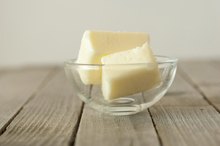Can I Drink Water Before a Fasting Blood Test?
Your doctor may ask you to take a fasting blood test to determine your cholesterol or blood sugar levels. The process of fasting ensures that the results of your blood test will not be confused by foods that you have eaten during the last few hours that your body has not fully absorbed. You should not eat food, drink coffee or take some medications for eight to 12 hours before a fasting blood test, but most physicians agree that you can drink water.
Effects of Water on Blood Test Results
Although eating food or consuming drinks containing nutrients, calories or sugar will affect the results of your fasting blood test, drinking water will have no measurable impact because it contains no calories, fats or sugars.
Dehydration and Drawing Blood
Is Butter on the Glycemic Index?
Learn More
If you are dehydrated when the nurse or physician performs your fasting blood test, it can be difficult for them to draw blood from your veins. Drinking water makes your veins plump and easy to access. For this reason it as actually a good idea to drink water before your fasting blood test.
Dehydration and Triglycerides
Dehydration can also affect your triglyceride count, which is one part of the lipid panel that doctors test along with your cholesterol by means of a fasting lab. It is a good idea to drink water before your lipid panel fasting blood test in order to reduce the risk of a deceptively high triglyceride reading due to dehydration.
Related Articles
References
- About fasting and triglycerides
- Collier R. Intermittent fasting: the next big weight loss fad. CMAJ. 2013;185(8):E321–E322. doi:10.1503/cmaj.109-4437
- Patterson RE, Laughlin GA, LaCroix AZ, et al. Intermittent fasting and human metabolic health. J Acad Nutr Diet. 2015;115(8):1203–1212. doi:10.1016/j.jand.2015.02.018
- Varady KA, Bhutani S, Church EC, Klempel MC. Short-term modified alternate-day fasting: a novel dietary strategy for weight loss and cardioprotection in obese adults. Am J Clin Nutr. 2009;90(5):1138-43. doi:10.3945/ajcn.2009.28380
- Arnason TG, Bowen MW, Mansell KD. Effects of intermittent fasting on health markers in those with type 2 diabetes: A pilot study. World J Diabetes. 2017;8(4):154–164. doi:10.4239/wjd.v8.i4.154
- Trepanowski JF, Kroeger CM, Barnosky A, et al. Effect of alternate-day fasting on weight loss, weight maintenance, and cardioprotection among metabolically healthy obese adults: a randomized clinical trial. JAMA Intern Med. 2017;177(7):930-938. doi:10.1001/jamainternmed.2017.0936
- Zhang J, Zhan Z, Li X, et al. Intermittent Fasting Protects against Alzheimer's Disease Possible through Restoring Aquaporin-4 Polarity. Front Mol Neurosci. 2017;10:395. Published 2017 Nov 29. doi:10.3389/fnmol.2017.00395
- Harvie M, Howell A. Potential benefits and harms of intermittent energy restriction and intermittent fasting amongst obese, overweight and normal weight subjects-A narrative review of human and animal evidence. Behav Sci (Basel). 2017;7(1):4. Published 2017 Jan 19. doi:10.3390/bs7010004
- Barnosky AR, Hoddy KK, Unterman TG, Varady KA. Intermittent fasting vs daily calorie restriction for type 2 diabetes prevention: a review of human findings. Translational research: The Journal of Laboratory and Clinical Medicine. 2014;164(4):302-11.
- Martin B, Mattson M, Maudsley S. Caloric restriction and intermittent fasting: Two potential diets for successful brain aging. Ageing Res Rev. 2006;5(3):332-353.
- St-Onge MP, Ard J, Baskin ML, Chiuve SE, Johnson HM, Kris-Etherton P, et al. Meal Timing and Frequency: Implications for Cardiovascular Disease Prevention: A Scientific Statement from the American Heart Association. Circulation. 2017;135(9):e96-e121.
- Stote KS, Baer DJ, Spears K, et al. A controlled trial of reduced meal frequency without caloric restriction in healthy, normal-weight, middle-aged adults. Am J Clin Nutr. 2007;85(4):981-8.
- Zauner C, Schneeweiss B, Kranz A, et al. Resting energy expenditure in short-term starvation is increased as a result of an increase in serum norepinephrine. Am J Clin Nutr. 2000;71(6):1511-1515.
Writer Bio
Devra Gartenstein is an omnivore who has published several vegan cookbooks. She has owned and run small food businesses for 30 years.









